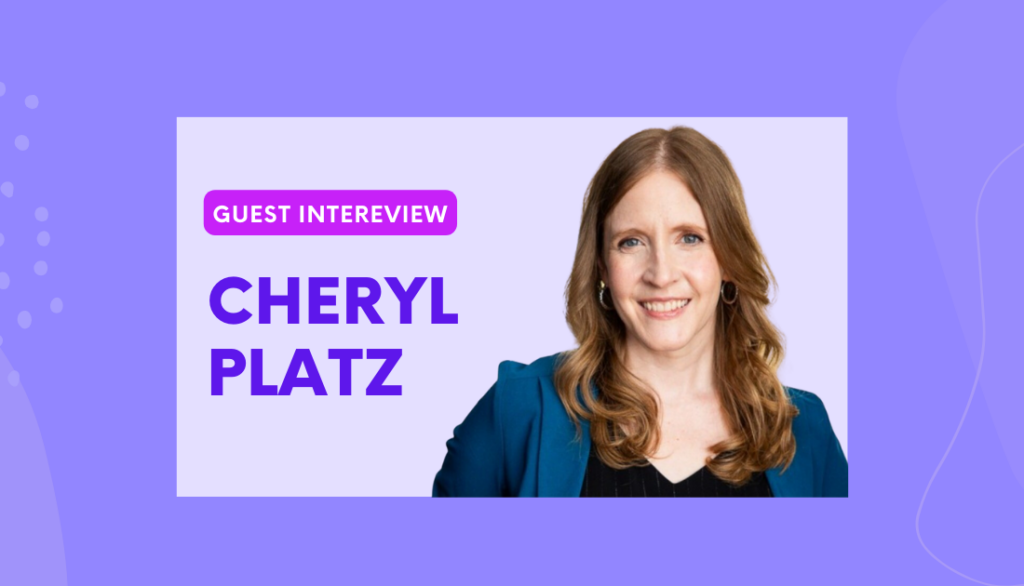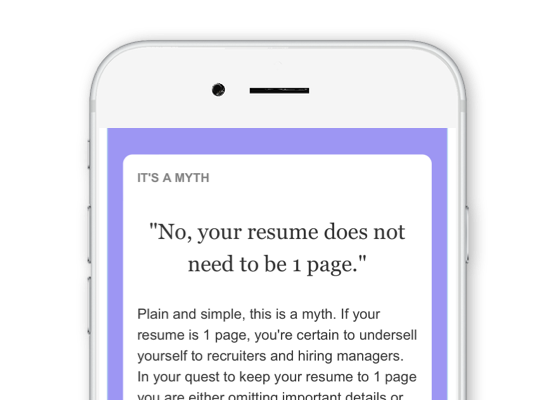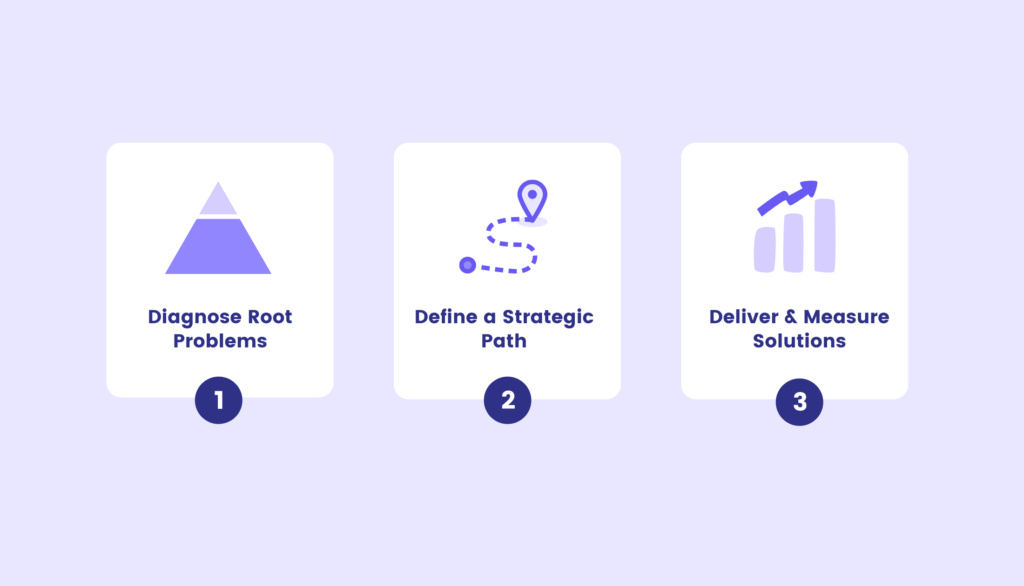Episode 67
How to Overcome Imposter Syndrome at Work and Grow Your Career
17 min listen
Episode 50
17 min listen

Listen to the Episode
Episode Summary
Feeling like you don’t belong or doubting your qualifications in your career? Overcoming imposter syndrome can be a challenge, but Career Strategy Lab coach Erin Lindstrom sheds light on how to navigate this common issue.
In this episode, she dives into imposter syndrome and how societal structures have contributed to it. She emphasizes the importance of building humble confidence, finding a balance between self-doubt and overconfidence. Exploring the process of self-reflection and learning to value your accomplishments, Erin offers actionable strategies for building the mindset needed to excel in your career.
Whether you’re contemplating a promotion, switching industries, or starting a new career, Erin provides insights applicable to various professional journeys. Discover how to move past imposter syndrome and embrace your unique strengths to thrive in your career.
Create your dream career, and life
- Book a free Career Strategy Call to learn how we can help you
- Get our free Career Roadmap to help you navigate your career
- Check out Career Strategy Lab, our 3-month career coaching program
Discussion Questions About The Episode
- How does the concept of imposter syndrome resonate with your personal or professional experiences? Can you identify any societal constructs that may have influenced these feelings?
- Reflect on a time when you've doubted your abilities or felt like you didn't belong in a certain role or environment. What were the underlying causes of those feelings, and how did you navigate through them?
- In your own words, describe what it means to embody humble confidence. How do you strike a balance between being open to feedback and not letting self-doubt overshadow your capabilities?
- Think about a specific project or role in your career where imposter syndrome may have influenced your behavior or decisions. How do you think approaching the situation with a mindset of humble confidence could have impacted the outcome?
- Consider a time when you've had to market or advocate for yourself professionally, such as in a job application, interview, or performance review. How did you navigate the feelings and mindset shifts that came with promoting your abilities?
Episode Transcript
Sarah Doody [00:00:00]: Hey there. I’m Sarah Doody, host of the Career Strategy Podcast. Many professionals are seeking more impact, flexibility, growth, and let’s face it, getting paid what they’re worth. But how do you unlock this in your career? It starts with strategy. I’m taking you behind the scenes of what’s working for my career coaching clients. You’ll hear strategies and actionable, yet sometimes against the grain, advice for how you can be the CEO of your career and stop in Mondays. Ready to level up your career? Let’s get after it.
Erin Lindstrom [00:00:36]: Hey, y’all. I’m Erin Lindstrom. I am one of the coaches inside of Career Strategy Lab, And Sarah asked me to take over the podcast today to talk about imposter syndrome. Imposter syndrome is something that we hear about all the time. Literally every single week on Mindset calls, this comes up, and it’s something that I think is really worth diving in and talking about. So on this episode, I’m gonna share with you a little bit about how I see imposter syndrome, the reality of it, and, you know, the constructs that are actually in our society that make it real, and then how we can overcome it from a mindset perspective without becoming an overconfident person who doesn’t hear any feedback. So I hope you enjoy this. And if you do, please feel free to leave a review, send us an email, send Sarah a LinkedIn message, and let us know.
Erin Lindstrom [00:01:23]: Here we go. This episode of the Career Strategy Podcast is all about overcoming imposter syndrome. And before we get into How to do that? I wanna talk about imposter syndrome as a whole, as a concept for a moment. So while imposter syndrome, is kind of, you know, a colloquialism. I think we all kinda get the idea. Right? When you have self doubt, when you feel like you don’t belong in a space, and I wanna call out that Many spaces have not been intended for everyone for many years. Right? And so many times inside of Career Strategy Lab, we have clients who are Women and people of color who feel like and express imposter syndrome. And I like to be very clear that, yes, this might be there might be some self doubt and that it’s not just because you don’t have confidence.
Erin Lindstrom [00:02:12]: Right? There have been structures in place to keep people out of power For a very long time, and so some of what we’re moving through could be related to that. So I just like to call that out because it’s not some Just made up a term, right, that we’re trying to move through by by meditating. Like, this actually requires systemic change, and it’s it’s a big deal. Okay. So I just like to call that out first before we get into it. Now when we talk about imposter syndrome and self doubt and Really struggling with believing that we are meant to be in a particular role, at a particular level of leadership, at a particular company. Those feelings can be very real. And the beautiful thing about the process inside of Career Strategy Lab and of career development in general, When you’re going through and reflecting on your career, many times, you’re extracting all of the amazing things that you’ve done To then share those stories on interviews.
Erin Lindstrom [00:03:11]: Right? And so the process of going back and looking at things can be very uncomfortable. Many of us have resistance to that. And if you stick with it and do it and if you really look at the things that have happened in the past, and collect those stories, you I mean, I see this all the time. Like, you become stronger, not only as a candidate, but as someone who is telling the story of your work Experience. And it’s an embodiment. It’s not just about the knowledge of what you’ve done. Right? It’s not about a list of things that you’ve done over the years or projects you’ve created or Apps you’ve taken to prod, it really is about whether or not you feel that and if you’re communicating that to people. Because you may have done some really cool things, and you don’t give yourself any credit for it.
Erin Lindstrom [00:03:57]: So going through the process of doing a career assessment and looking at your past Projects and really pulling out all of the things is very important. Okay? Unfortunately or fortunately, depending on how you’re looking at it, there is no Easy button to overcome imposter syndrome. It’s more of a process that requires you pulling evidence to show your brain and your subconscious mind, Oh, yeah. I have done all of these things. And to kind of convince yourself, like, yes. You are worthy of being here. And sometimes that is a very quick boom. Got it? Other times, it takes a while.
Erin Lindstrom [00:04:33]: And whatever situation you are in, I want you to know that that’s okay. There’s no perfect way to move through this. Inside of Career Strategy Lab, we work with 3 different types of people. We call them career climbers, who are people who have been in their jobs for years, Career switchers who are switching from 1 industry to another. Sometimes it’s, within tech but into UX. Sometimes it’s totally outside of tech and into UX, and launchers who are just starting their careers in UX. And each of these kind of avatars have different struggles around imposter syndrome, but they typically come down to the same root causes that I’m gonna talk about in this episode. So if you’re a climber, this might look like questioning whether or not you’re ready for a promotion and might Look like wondering if you can take on that next title and if you’re, quote, unquote, worthy of it.
Erin Lindstrom [00:05:19]: Spoiler alert, you are. For switchers, That imposter syndrome might come from really feeling like an outsider from having experience that you have to leverage in order to sell yourself to get that next job. Sometimes if you don’t have that direct experience, it does lead to a lack of confidence, and that’s okay. And what you need to Doody learn how to leverage the experience that you do have and build that bridge so it’s clear both to you on a confident side, right, And to future employers that, like, oh, yeah. You haven’t been in this industry, but you still can do all of these things. And if you’re a launcher, This might come up as kind of like the beginning of things, right, where anyone starting out can feel scared or afraid and potentially question whether or not they’re ready for that next step and if other people will perceive them as worthy and ready. And, yes, we are we’re there’s Everyone has a level of readiness in my humble opinion, and I will explain more about how to build that confidence through this episode. So when we start to talk about self doubt and imposter syndrome, I think about a spectrum.
Erin Lindstrom [00:06:25]: There is lack of confidence on one side, which I would say most people talk about the most. Right? They’re aware of this problem and like, I know I’m not giving myself enough credit or, like, I just I’m scared. I’m nervous. Like, it comes up in symptoms such as anxiety We’re we’re having that feeling. The other side of the spectrum is overconfidence, and overconfidence can kind of come off as Cocky, and I don’t need to learn anything. Like, I got this. I’m so good at these things, and there’s no room for hearing any feedback. So on the lack of confident side, Sometimes we are more open to feedback, but we take in every single piece of criticism instead of discerning who it’s from.
Erin Lindstrom [00:07:07]: And on the overconfident side, we listen to none of it. So it’s either all the way on, I’m listening to all the things and taking it and making it mean something about me. And on the other end of things, I’m not listening to anything. I don’t need anybody. I’m good to go. Mm-mm. Not happening. And these 2 sides of the spectrum, like, while different, they’re very similar.
Erin Lindstrom [00:07:28]: What they have in common is that they’re not necessarily based in, like, a stable Reality. Right? If we’re listening to nothing or we’re listening to everything, that means we’re not discerning either way. Right? There’s somewhere in the middle But I would say is, like, a place of humble confidence where you know that you are capable of doing things, that you have Experience, that you are Learning and are willing to learn. You’re willing to hear feedback, and you’re collaborating. Right? There’s a cocreation when you were at work. It’s not just you in a silo. Humble confidence makes you a great team member. It makes you a great leader.
Erin Lindstrom [00:08:06]: Right? If you think about different people in leadership, When someone User to take the lead, right, that could be the lack of confidence side, that can be very tricky, like and frustrating for people on a team. On the other side, if you have someone in charge who is overconfident and won’t listen to anything, also very frustrating. So that happy medium of humble confidence is where you are confident in your ability to do things, right, and that you know things, that you have been around, that you have learned from your Mistakes. Not that you’ve never made a mistake, but that you’ve progressed from there and the trust that you can figure it out going forward, not because you know everything. Right? Being able to figure it out means talking to others. It means doing research. It means gathering feedback. It means looking at evidence that other people have gathered, right, and having conversations and collaborating with them.
Erin Lindstrom [00:09:02]: You can only do that from a place of humble confidence. If you are on the side of the spectrum where you’re really dealing with lack of confidence, You might listen to someone who actually didn’t do anything, and we’re giving them all of the power in a situation. Right? You might have someone who’s Telling you what to do or saying it’s one way. And if we don’t have the confidence to kind of ask a question, right, Then you’re not gonna get where you’re going anyway. So we need to make sure that humble confidence is kind of like the zone that we’re in. And And so this is an invitation for you to kinda think about what does that zone look like for you? Sometimes it is easier in social situations like with friends to be in that space. Other times, it’s easier to be in that space in work. And for some people, it’s gonna be the same in both.
Erin Lindstrom [00:09:46]: But I would think about different social situations that you’re in. How does it feel like in your family situation? Right? When you’re around the people that you grew up with, if that ever happens, how do you feel? Do you tend to go to one side of the spectrum? Then, if there’s any activities, any sports you do, maybe you take classes at the gym. How do you feel? Are you more on the lack of confidence side? Are you overconfident? Are you somewhere in that middle? If you go and take a class to try something new, maybe you’ve done pottery, maybe you’ve taken an improv class, like, when you show up the first time, Notice where you are, and you can notice too that both sides of the spectrum, the lack of confidence and the overconfidence, they can be coping mechanisms. Ultimately, what we’re trying to do and what our brain wants to do is to keep us safe. And so for some of us, our brain will think that to keep us safe, we need to be quiet. Right? We need to assume that we shouldn’t be there. We need to be looking around and hypervigilant. And on the other side for people, they know that Power or appearing to have power is the way to stay safe.
Erin Lindstrom [00:10:51]: So these are really coping mechanisms. When you can come to a place where you feel like it’s true that you are both safe in this situation and that you can figure it out. That is where you can kind of be in that zone of humble confidence and where you can really start taking action from that place and collaborative action at that, which is where you get feedback, where you start to build relationships, which grows your sense of safety and allows you to have even stronger Impacts and outcomes. So what I hope you’re taking away from this is really just a lens to look through about imposter syndrome for yourself And for others that you may be working with, you might have people on your team who you can tell are dealing with this. And many people, especially on the lack of confidence Right? When they feel like they’re experiencing imposter syndrome, they’re so scared to be overconfident that they will Stay on the imposter side. You do not have to be scared. Most people who are feeling that lack of confidence, like, you are not gonna jump all the way to overconfidence. You will probably land right in humble confidence by just, you know, turning up the volume a couple notches on your confidence, and I would encourage you to try it on To act it out, when you are working on your resume or inside of Career Strategy Lab, we teach something called the compass statement, which have showcases who you are, what you’re looking for, your experience, and positions you as a very powerful candidate.
Erin Lindstrom [00:12:21]: Read that out loud. Sometimes it can feel like, oh, this is this is strong. Right? And I would challenge you to make it even stronger. Go to overconfidence zone and allow yourself to take up space and to say things that you would never say. Right? Like, to take credit for everything you’ve ever done where we know we’re on collaborative teams. Right? But just say that out loud, and then you will be able to feel when you’re back in that humble confidence zone of like, oh, yeah. This is this is correct. You know? Sometimes we have to let it be wrong, go a little bit too far to then understand, like, oh, yeah.
Erin Lindstrom [00:12:56]: This is the the right zone. Because we might be scared of that zone of humble confidence because we think it’s overconfidence, and there is absolutely a difference. You will know. A lot of this is feeling based. It is okay to stretch. It is okay to, you know, take up space and to own what you have done, and it is also So okay to step into new spaces and to not have all of the boxes checked. That does not mean you’re not capable of doing the work or of Helping to figure out the challenge. Remember that when you are inside of a company, when you are taking on a job, you are part of a team.
Erin Lindstrom [00:13:32]: Even if you’re a contractor and you are the only person on your team, you are working with a business, and that again is a team. You don’t have to come up with everything. It’s about asking the right questions to figure out the best next steps, and that just requires your judgment and, really, your presence in that moment. And what humble confidence gives you is the ability to be present because you’re not worrying about being too much or being too little. You’re just Sarah, And I think that is, like, a true gift. So I hope this was helpful. If you have any questions about imposter syndrome, you are welcome to send an email to admissions@careerstrategylab.com, and we can talk a little bit about what might be happening. If CSL, could be a fit for you, no worries if not.
Erin Lindstrom [00:14:18]: And depending on when you’re listening to this, we are hosting a free master class on January 16th, about becoming the CEO of the product of you and the mindset shifts that really requires. A lot of times, like in CSL, we’re talking about the product of you, which means designing, marketing, and selling yourself as a candidate to get the job that you want. And There is a whole mindset thing that goes along with this because it’s not always tricky. Right? Like, you can watch a YouTube video of how to redo your resume. It’s not hard on the surface. What can be hard is the feelings that come up around it. What can be hard is figuring out how to focus. What can be hard is Processing past work experiences where maybe you had a toxic boss or maybe you did get written up or had an evaluation or a pit plan.
Erin Lindstrom [00:15:10]: These things happen, and it’s okay. And a lot of times, it’s because of the leadership and not because of you. And there’s room for us to take personal responsibility along the way. What have you learned from that? Right? So no matter what’s coming up for you on the journey, if you find that things sometimes feel hard when you know they shouldn’t be that hard, Mindset is something that we can look at, so you’re more than welcome to join us on that call. Thanks for listening to the career strategy podcast. Make sure
Sarah Doody [00:15:35]: Sure to follow me, Sarah Doody, on Twitter, Instagram, YouTube, or LinkedIn. If anything in today’s episode resonated with you, I’d love to hear about it. Tag me on social media or send me a DM. And lastly, if you found this episode helpful, I’d really appreciate it if you could share it the friend, or give us a quick rating on Spotify or review on Apple Podcasts. Catch you later.













